
Yes are an English progressive rock band formed in London in 1968 by lead singer Jon Anderson, bassist Chris Squire, guitarist Peter Banks, keyboardist Tony Kaye, and drummer Bill Bruford. The band has undergone numerous lineup changes throughout their history, during which 20 musicians have been full-time members. Since February 2023, the band has consisted of guitarist Steve Howe, keyboardist Geoff Downes, bassist Billy Sherwood, singer Jon Davison, and drummer Jay Schellen. Yes have explored several musical styles over the years and are most notably regarded as progressive rock pioneers.

William Scott Bruford is an English former drummer and percussionist who first gained prominence as a founding member of the progressive rock band Yes. After leaving Yes in 1972, Bruford spent the rest of the 1970s recording and touring with King Crimson (1972–1974), Roy Harper (1975), and U.K. (1978), as well as touring with Genesis (1976). In 1978, he formed his own group, Bruford, which was active until 1980.

Stephen James Howe is an English musician, best known as the guitarist and backing vocalist in the progressive rock band Yes across three stints since 1970. Born in Holloway, North London, Howe developed an interest in the guitar and began to learn the instrument himself at age 12. He embarked on a music career in 1964, first playing in several London-based blues, covers, and psychedelic rock bands for six years, including the Syndicats, Tomorrow, and Bodast.

The Yes Album is the third studio album by English progressive rock band Yes, released on 19 February 1971 by Atlantic Records. It was the band's first album to feature guitarist Steve Howe, who replaced Peter Banks in 1970, as well as their last to feature keyboardist Tony Kaye until 1983's 90125.
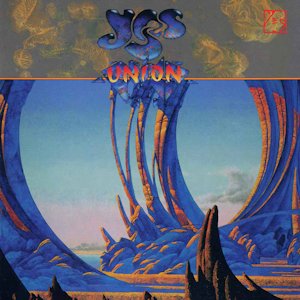
Union is the thirteenth studio album by English progressive rock band Yes, released on 30 April 1991 by Arista Records. Production began following the amalgamation of two bands that featured previous and then-current members of Yes: Anderson Bruford Wakeman Howe (ABWH), consisting of vocalist Jon Anderson, drummer Bill Bruford, keyboardist Rick Wakeman and guitarist Steve Howe, and Yes, comprised at that time of bassist and vocalist Chris Squire, guitarist and vocalist Trevor Rabin, keyboardist Tony Kaye and drummer Alan White. The eight musicians signed with Arista and a combination of unfinished tracks by both groups were selected for Union. The album's sessions were problematic from the start, including disagreements between some of the musicians regarding the "merger" of the two bands, strained relations during the recording process, and decisions by the production team of Anderson and producer Jonathan Elias to bring in session musicians to re-record parts that Wakeman and Howe had originally completed.
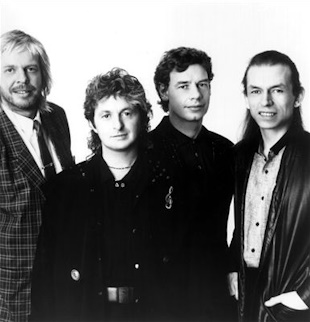
Anderson Bruford Wakeman Howe (ABWH) were an English progressive rock band active from 1988 to 1990 that comprised four past members of the English progressive rock band Yes. Singer Jon Anderson left Yes as he felt increasingly constrained by their commercial and pop-oriented direction in the 1980s. He began an album with other members from the band's 1970s era: guitarist Steve Howe, keyboardist Rick Wakeman, and drummer Bill Bruford, plus bassist Tony Levin.

GTR were a British supergroup rock band founded in 1985 by former Yes and Asia guitarist Steve Howe and former Genesis guitarist Steve Hackett. Though the band's leaders were known as progressive rock musicians, GTR appealed to AOR radio stations. The band lasted for two years and one album. Hackett subsequently criticized the project, though not necessarily the other musicians involved in it.

Keys to Ascension 2 is the fifth live and sixteenth studio album by the English progressive rock band Yes. It was released as a double album in November 1997 by Essential Records as the successor to the previous live/studio album Keys to Ascension. After guitarist Steve Howe and keyboardist Rick Wakeman returned to the band in 1995, the group relocated to San Luis Obispo, California and started to write new material. The reunion of this particular line-up was promoted with three concerts at the city's Fremont Theater in March 1996, the five's first live performance together since 1979. Keys to Ascension 2 features the remaining half of the live set from the 1996 shows and five new studio tracks including two ones which marked a return to the group writing long-form pieces.
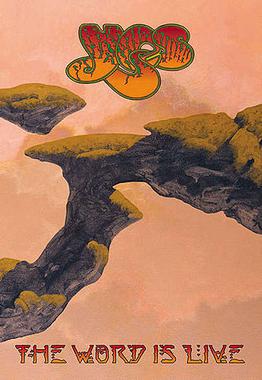
The Word Is Live is a box set by the English progressive rock band Yes, released in August 2005 by Rhino Records. A triple album, the set is compiled of live recordings from radio broadcasts and concert tours between 1970 and 1988, mostly from guitarist Steve Howe's tape collection.

Yesyears is the first box set by English progressive rock band Yes, released in August 1991 on Atco Records. After the group left Atco for Arista Records when they became an eight-man formation in 1990, the deal gave Atco the right to the band's back catalogue, thus allowing them to release a career-spanning box set. Yesyears contains studio and live tracks from 1969 to 1991 with previously unreleased mixes and songs, digitally remastered by Joe Gastwirt.

In a Word: Yes (1969–) is the second box set by the English progressive rock band Yes, released in July 2002 by Rhino Records. The five-CD set includes tracks from the band's entire career between the years 1969 to 2001, including material by Anderson Bruford Wakeman Howe and previously unreleased tracks.
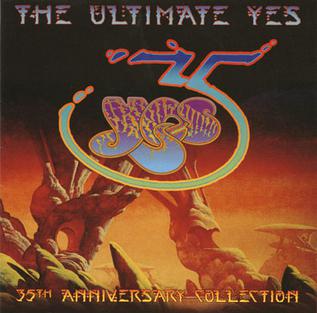
The Ultimate Yes: 35th Anniversary Collection is a compilation album by the English progressive rock band Yes. It was originally released on 2 CDs on 28 July 2003 by Warner Music in the United Kingdom. A 3 CD edition with additional material, including new recordings from October 2003, was released in the US on 27 January 2004 by Rhino Records.
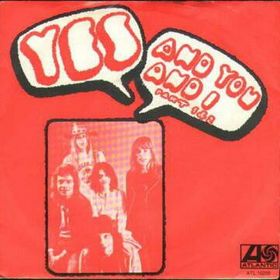
"And You and I" is the second track from the album Close to the Edge by the English progressive rock band Yes. The song is just over ten minutes in length and consists of four movements. The first and second parts of the song were released as a single edit and reached number 42 on the Billboard Hot 100.
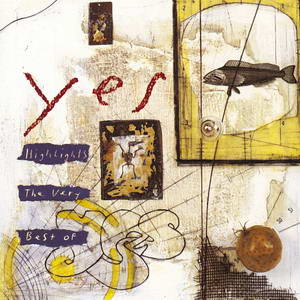
Highlights: The Very Best of Yes is the fourth compilation album by English progressive rock band Yes, released in September 1993 on Atlantic Records. It contains 12 tracks that span most of the group's history, from their debut album Yes (1969) to Big Generator (1987). The set reached gold certification by the Recording Industry Association of America for selling 500,000 copies in the US.

Fragile is the fourth studio album by the English progressive rock band Yes, released on 12 November 1971 by Atlantic Records. It was the band's first album to feature keyboardist Rick Wakeman, who replaced Tony Kaye after the group had finished touring their breakthrough record, The Yes Album (1971).
Circa is a progressive rock supergroup founded by four musicians associated with Yes: former Yes members Alan White (drums), and Tony Kaye, current Yes members Billy Sherwood and Jay Schellen (drums), and guitarist Jimmy Haun, who played on the Yes album Union.

The Steve Howe Album is Yes guitarist Steve Howe's second solo album. It was released in 1979. The album features Yes band members Alan White, Bill Bruford and Patrick Moraz. Also featured is Jethro Tull's former drummer Clive Bunker on percussion on Cactus Boogie. Ronnie Leahy is also featured on keyboards for two songs; he would later play with Jon Anderson on his second solo album, Song of Seven in 1980.

House of Yes: Live from House of Blues is a live album and video by the English progressive rock band Yes, released on 25 September 2000 by Eagle Records in the United Kingdom and by Beyond Music in the United States. It is a recording of the band's performance at the House of Blues at Mandalay Bay in Las Vegas on 31 October 1999 during their world tour supporting their eighteenth studio album The Ladder. By the time of the album's release, guitarist Billy Sherwood and keyboardist Igor Khoroshev were already out of the band, reducing Yes to a four-piece.
Steve Howe is an English guitarist, active since 1964. He is best known for his tenures with the rock groups Yes and Asia, including his solo albums.
"Five Per Cent for Nothing" is an instrumental by the English progressive rock group Yes from their 1971 album Fragile. One of five tracks on the album that were meant to showcase individual members’ talents, it was composed by the band's drummer, Bill Bruford. At 35 seconds in length, it is the shortest song Yes has ever recorded and their only song credited solely to Bruford.

















